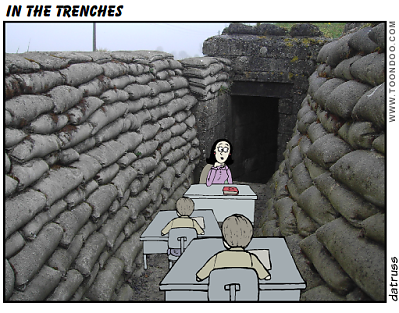I do not know of a time in history when ‘being in the trenches’ conjured a pleasant image? Yet in the past few weeks I’ve heard teaching referred to a number of times that way. I’ve made this reference before, but not for a long time now, and that has been intentional. Like I mentioned in my “Let’s Transform Our Learning Metaphors” Ignite presentation a while back, it’s time for us to look at the metaphors we use in education and really question them.

But of all the metaphors we use, this one baffles me the most. How did an analogy of one of the ugliest parts of one of the messiest wars become the ‘home’ of teachers in classrooms?
If you are a teacher, you are not in the trenches… you are in an amazing place where we change the lives of young children. You don’t leave students shell-shocked. You don’t dodge bullets, or carry a gas mask, or deal with trench foot. And you don’t have anything to gain by metaphorically connecting the classroom to trenches.
Let’s leave trenches to the history buffs, and move our classrooms into an era of discovery, enlightenment and openness.

What’s a learning metaphor that you either hate or love?

I think you misunderstand the metaphor. The people actually enacting the strategies of war were those who were “in the trenches.” The generals who made the strategies were not “in the trenches.”
Ed policy makers are therefore not “in the trenches”. They may (or may not) have good general ideas and goals, but their job is not to carry out the details of making them happen in the classroom. That would be the job of teachers, who are therefore considered to be “in the trenches.”
Greetings Dave,
While I understand your point, I still don’t understand the value of putting teachers in any trenches (metaphorically). What benefit does the metaphor bring, when it conjures up images of war? The job of a teachers is amazing, and it is challenging, but it isn’t a battle, and they are not troops, and there isn’t a common enemy that is being fought.
Metaphors We Live By is an insightful book that helps us understand that the metaphors we choose influence our thinking and I can’t see a positive influence that a trenches metaphor brings to education.
Thanks for commenting,
Dave
I was thinking about your comments too Dave. While I understand your reasoning, please understand how this metaphor was explained to me. Men or women in the trenches are there together. For good or for bad, they must trust, collaborate, and rely on one another. They all face similar circumstances and in order to have a positive outcome, they must be transparent in their thoughts, words and their actions because lives matter. In our case, kids lives matter and our goal is for every student to find success. Our support system in the “trenches” is crucial. ? Will I live and die by this metaphor? Of course not. It is for our students that I live and die by because they are our future.
It sounds like the metaphor works for you Lisa. I would just rather not use a war metaphor to describe teaching. You aren’t ever in a trench in a time of peace, and the battle you are fighting in trenches always includes painful losses and hardships.
Your description could work for anyone on a sports team working together, and so why not use sports metaphors and leave wartime metaphors out of our schools and classrooms? We still do the same things, we just don’t describe ourselves in a way that connotates battles with casualties and enemies out to get us.
Truly appreciate the comment Lisa, and glad the spirit of teamwork and collaboration is what you gain from the metaphor. We need that kind of thinking in our schools, I just don’t think we need this metaphor to describe it.
Cheers,
Dave